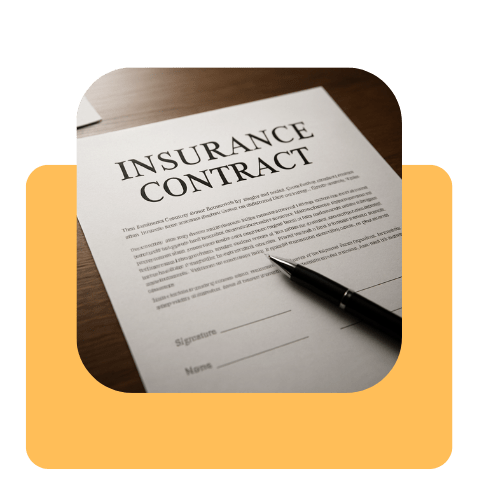Income Protection Insurance
Everything you need to know about Income Protection Insurance

Income Protection Insurance
Everything you need to know about Income Protection Insurance

Understanding Income Protection Insurance: What You Need to Know
What Is Income Protection Insurance?
How Does Income Protection Insurance Work?
When signing up for Income Protection Insurance, policyholders have the flexibility to select a waiting period. This waiting period is the interval between the onset of an illness or injury and when the insurance benefits start to be paid. Policyholders can choose a waiting period that suits their needs and budget, with options typically ranging from as short as 14 days to as long as two years. Shorter waiting periods generally result in higher premium costs, so individuals can adjust this based on their savings and how long they can manage financially without the insurance kicking in.
The benefit period of Income Protection Insurance is another critical aspect. It defines how long the insurance payouts will continue while the insured is unable to work. This duration varies widely depending on the policy chosen and can extend from a few years to until the policyholder reaches retirement age, typically 65 years. Choosing the right benefit period involves considering one’s career longevity and potential health risks, ensuring continuous financial coverage until one can either return to work or transition smoothly into retirement
WHAT DOES INCOME PROTECTION INSURANCE COVER?
Income Protection Insurance may include cover against:
What expenses are covered?
Income Protection Insurance in Australia replaces up to 70% of your income if illness or injury stops you from working. Protect your finances, cover expenses, and focus on recovery with reliable income support.
Loss of Income
Medical Expenses
Rehabilitation Costs
Transportation
What is excluded from income protection insurance?
Income Protection Insurance policies offer crucial support for a range of circumstances. They provide coverage for lost income due to illnesses or injuries that prevent you from working, with various options for customisation and extensions available. However, it’s important to note that not all policies provide the same extent of coverage, and many come with standard and specific exclusions that could impact your financial security.
Pre-existing Conditions:
Drug or Alcohol Influence
Dangerous Sports and Activities
Exposure to exceptional danger
Amateur Football
Intentional Self-Injury
Criminal Acts
War and Civil Commotion
AIDS
Childbirth
Professional Sport
Why Choose Us?
As your dedicated Income Protection Insurance Advisor, we focus on providing you with general information and detailed comparisons of various policies. Our aim is to equip you with the knowledge needed to make an informed decision. By presenting a wide range of options and clearly explaining the differences between them, we help you find coverage that best fits your needs. Our comprehensive approach ensures you have all the necessary information to choose the most suitable policy based on your unique situation.
General Advice: The information in this communication contains general information only. We have not taken into consideration any of your personal objectives, financial situation or needs. Before taking any action you should consider whether the general advice contained in this communication is appropriate to you having regard to your situation or needs. We recommend you consult a licensed or authorised financial adviser if you require financial advice that takes into account your personal circumstances.

FREQUENTLY ASKED QUESTIONS
Under most income protection policies, if you return to work before the end of the designated benefit period and begin earning a partial income, you are likely eligible for what is termed as ‘partial disability benefits’. These benefits are designed to supplement the income you earn, should you find yourself capable of working in a limited capacity but not yet able to return to your full duties or previous earning capacity.
Partial disability benefits effectively bridge the gap between your partial earnings and the level of income protection initially determined by your policy, supporting a more flexible and gradual transition back to work. This arrangement acknowledges that recovery can be a progressive journey, allowing you to gain financial support while encouraging a return to professional activity as your health permits. It’s important to review your specific policy details or consult with your insurance provider to understand the precise terms and conditions that apply to earning additional income during the benefit period.
Income protection insurance offers essential financial support when illness or injury prevents you from working, but it’s important to know the limitations and exclusions that typically accompany these policies. Being aware of these exclusions helps in setting realistic expectations about the scope of the insurance cover. Here are some common exclusions that you’re likely to encounter in income protection insurance policies:
Pre-existing Medical Conditions: Coverage does not typically extend to health issues that were known or diagnosed before the policy initiation. This includes any related symptoms or treatments that existed prior to the commencement of the policy.
Injuries Caused by Self-Harm: Any injuries that are the result of intentional self-harm, including suicide attempts, are usually not covered under income protection policies.
War & Terrorism: Any disability or injury resulting from wars, acts of terrorism, or similar conflicts is generally not included in the coverage.
Illegal Activities: Injuries or disabilities that arise while engaging in unlawful acts or as a result of criminal behavior are not covered.
High-Risk Behaviors: Participation in activities that are considered dangerous or high-risk, such as certain extreme sports or professional sporting events, may lead to exclusions from coverage.
The waiting periods available for choosing are 30 days, 60 days, or 90 days. This is the period you must wait after becoming disabled before your insurance benefits can start.
Income protection insurance benefits are generally paid on a monthly basis, but in arrears. For example, if your policy has a 30-day waiting period, you would receive your first payment 60 days after the onset of disability.
The timing is structured such that there is always a month delay from the end of the waiting period to the disbursement of your first payment.
Yes, premiums paid for income protection insurance are generally tax-deductible. This is because the insurance is considered a way to protect your income-earning capacity, and thus the premiums are viewed as an expense incurred in earning taxable income.
The cost of Income Protection Insurance can vary widely based on several factors such as
- Age
- Occupation
- Health status
- Cover
Consulting with an expert, like Morgan Insurance Advisors, can help you navigate these variables and find the most cost-effective solution tailored to your specific circumstances.
The maximum benefit of income protection is usually 70-75% of your pre-tax income. You can also choose longer benefit periods, and shorter wait periods to maximum your income protection insurance payouts.
Determining whether you have income protection insurance within your superannuation fund depends on the specific provider and the type of superannuation fund you’re in. Many superannuation funds include default insurance coverage as part of their offering.
Morgan Insurance Advisors can help you navigate this process. Our team can review your superannuation details to determine if you have income protection insurance and advise you on the best options available.
| Factor | Considerations | Typical Guidelines |
|---|---|---|
| Retirement Age | Plan to retire at a specific age; Ensure sufficient superannuation and retirement savings | Many stop at or around age 65 |
| Financial Stability | Assess substantial savings, investments, debts, and financial obligations | Stop when financial obligations are met |
| Health Status | Evaluate current health, potential risks, and existing health insurance | Good health and comprehensive health insurance might justify stopping earlier |
| Policy Terms | Understand policy expiry age and increasing premiums with age | Policies often cease at age 65 |
| Typical Age Range | Align with retirement plans and financial readiness | Early retirement or age 65 |
| Personalized Advice | Seek tailored advice from financial or insurance specialists | Consult Morgan Insurance Advisors |
The choice between life insurance and income protection insurance depends on your personal circumstances, financial goals, and the needs of your dependents.
Consider Life Insurance If:
- You have dependents who rely on your income.
- You have significant debts (e.g., mortgage) and want to ensure they are covered.
- You want to provide a financial safety net for your family in the event of your death.
Consider Income Protection Insurance If:
- You rely on your income to cover living expenses.
- You want to ensure financial stability if you are unable to work due to illness or injury.
- You have financial obligations that need to be met regularly, even if you are unable to work.
Income protection insurance is designed to provide you with a regular monthly income if you are unable to work due to illness or injury. This type of insurance typically covers up to 75% of your pre-tax income, ensuring that you can maintain your living expenses during your recovery period. The benefits are paid out for a specified period, which can range from a few months up to age 65, depending on your policy terms. Income protection is ideal for situations where you experience a temporary or prolonged inability to work but are expected to recover and return to employment.
On the other hand, TPD insurance provides a one-time lump sum payment if you are diagnosed with a total and permanent disability that prevents you from ever returning to work. This lump sum is intended to offer long-term financial security and can be used to cover significant expenses such as medical bills, home modifications, and ongoing care needs.
While you can receive Centrelink benefits while on income protection, the payments you receive from your insurance policy will affect the amount and eligibility for certain Centrelink benefits. It’s important to report all income accurately as Centrelink applies an income test to determine eligibility for payments such as JobSeeker Payment, Disability Support Pension, and other allowances. If your income protection payments exceed certain thresholds, your Centrelink payments may be reduced or you may become ineligible for certain benefits.
When income protection insurance premiums are paid through your superannuation fund, the premiums are considered to be paid by the fund, not by you directly. The superannuation fund can claim a tax deduction for these premiums, which effectively reduces the tax liability of the fund. Since you are not paying the premiums out of your personal, after-tax income, you cannot claim a personal tax deduction for them.
If your income protection insurance is paid through your superannuation fund, the premiums are not directly tax deductible for you personally. Instead, the superannuation fund can claim a tax deduction for the premiums paid.
The portion of the income protection insurance premium that is tax deductible in Australia is typically the part of the premium that covers the loss of income.
Income protection insurance premiums are generally tax-deductible in Australia.
Income protection insurance premiums are exempt from GST (Goods and Services Tax). This means that you do not have to pay GST on the premiums for your income protection insurance.
In Australia, if your employer chooses to shut down their business, relocate operations to a different location, or close the current business in order to start a new venture, you may find yourself without employment. Such scenarios where job loss results from the employer’s decision to cease business operations or undertake significant restructuring are not uncommon. It is important to understand that in these circumstances, income protection insurance typically does not provide coverage. Income protection policies in Australia are designed to offer financial support when you are unable to work due to illness or injury, not due to economic changes or business decisions made by your employer. Therefore, if you are terminated because the business you work for is ending or moving, income protection insurance will not compensate you for lost income during your period of unemployment.
Further Reading / Guides
Want to learn more about Income Protection Insurance?
Here are some in-depth guides, written to help you understand all aspects of Income Protection:
- What is Income Protection Insurance and Why Is It Essential for Your Financial Security
- What Does Income Protection Insurance Cover and How Does It Work?
- How Much Income Protection Insurance Do You Really Need?
- Who Should Get Income Protection Insurance?
- The Top 5 Common Misconceptions About Income Protection Insurance

